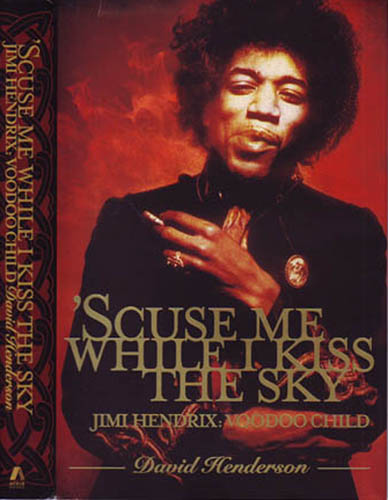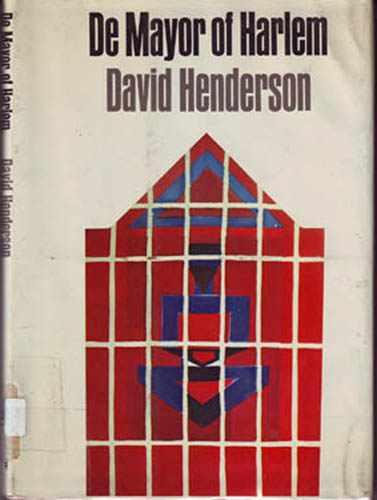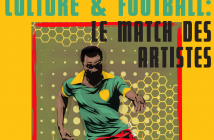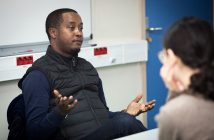« I did not want the joy of African-Americans to be manipulated »
David Henderson is a well-respected poet born in Harlem in 1942. At the age of 19, he co-founded Umbra, a group of young black writers and poets who played an important role in the birth of the Black Arts Movement – the artistic branch of the Black Power Movement. Based in the Lower East Side of Manhattan, Umbra organized weekly criticism and writing workshops and held public readings, soon to become very popular. The saxophonist Archie Shepp and the pianist Cecyl Taylor gave their support to this embryo of the Black Arts Movement. In 1963, this collective of young writers created a magazine, with Henderson as a co-editor, then editor. Amongst the voices that expressed themselves in the Umbra Magazine, there were those of Richard Wright, Alice Walker and Ishmael Reed.
David Henderson. There is no point in trying to label this prismatic character. His path through life is a polyphonic one. He is a poet, a writer, a critic, a professor of African-American literature, the creator of a « funk opera » (Ghetto Follies) and of radio documentaries, the author of an excellent biography of guitarist Jimi Hendrix – the first one, published in 1978, the result of more than five years of work (1). David Henderson is also the author of lyrics – and a voice – used in jazz albums signed by artists such as Ornette Coleman (« Science Fiction LP »), David Murray (« Let The Music Take You »), Sun Ra (« Love In Outer space »). Henderson is considered as a literary heir to Langston Hughes. In tune with a turbulent collective history, his tormented poetic work is spangled with tragic events (the 1964 Harlem riots, the assassination of Malcom X in 1965, Apartheid in South Africa
). In his writing, you also come across legendary jazzmen – such as Thelonious Monk, John Coltrane, Elvin Jones -, or people like Jean-Michel Basquiat and Pablo Neruda. Part of Henderson’s work belongs to « Jazz Poetry ». His intellectual guides? Amongst others, Langston Hughes, Frantz Fanon and Aimé Césaire. To the African continent, where to his great regret he has never been, he likes to relate himself by going to see movies, regularly attending the New York African Film Festival. He tells of his admiration for Ousmane Sembène, the cineaste and the writer, whose work he has been using in his classes.
David Henderson is also an activist-poet with the heart of a militant. He took part in several black action groups and anti-war movements. A finely hone critic, he likes to maintain the posture of an « ever vigilant », ready to awaken misgivings. Engaged in the denunciation of the American invasion and occupation of Iraq, today his eyes are riveted on Palestine. Hardly had the interview started when he begun denouncing with virulence Israel’s repeated attacks: « What just happened in Palestine to me looks like a genocide. It makes me sick. I hope that Obama will be very strong about it« . Although he broke out into a burst of joy the evening of Obama’s victory, it was with a clear touch of irony looking at himself. Henderson demystifies the event, insisting on not being trapped by an idealization process, to him a ferment causing a dangerous drowsy state.
Manhattan, January 2009
« I did not want the joy of African-Americans to be manipulated »
-On November 4, Barack Obama was elected. On January 20, his inauguration took place. How do you feel about all this? – you the witness of more than half a century of American History, you the poet, you one of the initiators of the Black Arts Movement?
On the election day, a contingent of Lower Eastsiders (2), which I was part of, went to Times Square -where we saw Obama’s speech on the Jumbo Tran -, and then continued to Harlem. We had thought of going to the State Office Building where Congressman Charles B. Rangel and other politicians hosted parties with live music and food. But we were waylaid at a place called « The Shrine », on 134th street and 7th Avenue. It is some kind of extension reminiscent of Fela Ransom Kuti’s renowned club in Nigeria of the late 20th century. The DJ played some amalgam of reggae, Afro-Beat and soul and it was amazingly fabulous to dance to. Right next to this place was an African restaurant where well-dressed Africans lounged and ate in well-lit connected rooms. They looked out on us, standing all in the street and in and out of the club, almost curiously – as we were all so excited, extended, nearly foolish in our rapture. Now that we have celebrated, the real work begins.
-Regarding the inauguration: tell me first what was for you the most powerful moment.
To me the most significant event was Aretha Franklin singing My Country’Tis of Thee at the inauguration in Washington D.C. She is the voice of our generation. She grew up in church. Her father was a famous Baptist preacher engaged in the Civil Rights Movement. They both very actively supported Martin Luther King, raising significant funds whenever the need arose, which was often. So here she is singing this gospel for Obama
That was amazing. The other significant event was at an inaugural ball where for the first time ordinary people were invited and in attendance ; when Obama and his wife took their first dance together as a president and first lady, as Beyonce sang her beautiful version of Etta James’ At Last.
-What did you do on this inauguration day and how did you feel?
I felt very strong about it. But something about me was withholding a lot of emotion because I felt afraid I might be disappointed. I was of course happy but also afraid my emotion might be exploited. I did not want the joy of African-Americans to be manipulated. I did not want an exploitation of Black culture. It is a great honor to have a Black president but I also felt torn. I didn’t go to Washington DC. I chose to stay in New York. I watched some of the festivities but didn’t celebrate. It was very strong. There was that crazy energy which you could feel even watching the inauguration on television. But to me there was an overabundance of joy and I refused to be part of it. I wanted to maintain a calm and balance because of the great power of the moment.
This has been a quiet reflective time for me. Gearing up for this new ride, which will be a strange adventure. This is a new page. Actually a friend of mine said: « this is a new book ». I agree with him. It is a new book – it better be a new book! It’s almost like an intervention of extraterrestrial aliens, or like something divinely inspired. This was out of the blue, pretty much.
-What are your hopes for the future?
I hope all this emotion and triumph can carry us forward the way we need to go. A true new day. But I resent this huge emotional consensus, especially among African-Americans. Of course we are going to feel joy. We have this black man in the White House… Of course it makes me happy to see him and his wife and children, but at the same time I’m afraid Black people will be very uncritical of Obama and that scares me. Now we are supposed to be so happy to have a Black President that we are going to forget all about any levels of justice
I feel we are somewhat manipulated emotionally. I don’t want the history of my oppression to be used against me.
-You feel manipulated by whom?
I guess you can say the system. Like the whole set up. Capitalism. Like what former president Eisenhower – the hero of World War Two – warned us about – the dangers of the military, industry, congressional complex as he left office to give way to the presidency of John F. Kennedy. At this point in time I feel the country has been ripped off. There are these people who have taken so much money out – as much as they could. What they have done with the economy is a crime. They have raided the treasury. They have purposefully driven America down economically. In a way they have driven America in the direction of an economically second or third-rate country – so that they can continue to rip off the place. And from the last days of the campaign, to the electoral victory and the ever-escalating Obama fervor, we could say that the country celebrating its democratic affirmation has been used as a smoke screen while the bankers revolted and drained the treasury. The challenge for Obama is to get out from this economic oppression.
-The history of African-American people is marked by a series of traumas, among which a collective deportation from the African continent, slavery and segregation. Do you think Obama’s victory will have the effect of a collective healing?
A lot of people have good feelings but I don’t want to be exploited emotionally so I would be very careful about accepting personally that type of healing process. Or I would want to accept it in a pure way, in its essence. This could be a transformation of the society into a better place. I hope it is. I believe that part of the transformation to a positive future is to have an African-American president. But at the same time I believe it is important for my contribution to the energy to be skeptical and reflective.
-Is Obama’s victory going to have an effect on the issue of Black people’s self-esteem?
I see some black women bleach their skin and straighten their hair because they are afraid of not being attractive. That insecurity is an emotional problem related to oppression, institutional racism. Like a straight take on Aryanism, from a well-enforced racist aesthetic, especially as reflected in the media.I must say I’m not sure Obama will change things as regards this issue. But I believe he will definitely change the overall course of history, and I think he will have a big impact on Black people’s self-esteem. I feel it already. And I feel this change in self-esteem will help this country and the world make the changes necessary towards a new order, a way of being for all of humanity that will be in line with the peace, prosperity and ecological adjustments that the accumulation of knowledge demands at this place in time.
-What about the effect of his name – Barack Hussein Obama?
Obama is a very rhythmic, non-American, New America type of word. It has become like a public mantra. In the press, the type of news we have is mostly repetitive. So you naturally get a repetition of Obama’s name. Then there are the people who are supportive of him who say his name over and over again, who chant his name over and over again. And of course that became part of what his campaign was about. You wanted people to say his name over and over again so that when they went to the voting booth they remembered it. It’s very basic stuff. It becomes a mantra, whether you recognize it or not. In many ways, it’s a subconscious mantra. That’s part of advertising – name recognition. People just relate to the sound of the word. It’s not profound. In some way, the more people feel that Obama is someone who is going to solve their problems or give them good feelings about themselves, the more they say his name in reverence and in love. And it’s a mantra that you say over and over again. It’s not profound. It just is.
The Barack part of his name is interesting because it sounds more like the names of many people in the Middle East, Eastern Europe. One prominent Israeli leader has a similar first name. The name Amiri Baraka (3) – the renowned African-American poet who is probably the most important one in America today – is also similar. But the similarity with Saddam Hussein, the deposed and executed Iraqi leader, is the most significant. And I think the real resonance is with Saddam Hussein’s sons. The vulgarity of their treatment was disgusting; their dead bodies were mutilated in some incomprehensibly vengeful way. To have that name inscribed in our history, to me, is in some kind of way a making of amends the universe demands. Especially since we have discovered that the entire premise of the war was ill founded.
-With the victory of Obama, an idea started circulating: that African-Americans should now be called Americans. How do you feel about that?
To me, this is just a distracting ridiculous argument. That’s why we need poets, writers and cultural commentators to warn and guard us from such frequently occurring stuff of that nature. Our self-esteem as a people started, one could say, when we began naming ourselves. When we (and Umbra was very central in this) began rejecting the racial designation of, as Malcom X used to often say, « the so-called Negro », and started referring to ourselves as Black – which led to the term African-American. That began our self-naming. But it also further established Black as a way of incorporating all of the African originated people of the diaspora.
-In what way is this idea (that African-Americans should now be called Americans) distracting?
Because this means contemplating things irrelevant to our needs and goals. Economic criminality, poverty, warfare, ecological necessities locally and worldwide in all categories are the real problems. Not what we are going to call ourselves.One of the biggest elements of racism is the failure to properly educated Black kids. The hope of a proper education is what led a good many Blacks into the support of integration as an element of the Civil Rights movement. But we have seen how this strategy has been thwarted. Most school systems are in fact still segregated. The majority of Blacks face a similar discrimination and segregation as in the old Jim Crow days. And this is allowed to continue because it keeps the funding down by secretly supporting the out-of-date racist theories that Blacks are inferior intellectually. The country pays a huge price for this type of discrimination – having to import many students from other countries and cultures to satisfy a growing science and technology industry and the growing number of research and development jobs in those sectors.
-Don’t you think Obama is aware of these needs and willing to address them?
I think Obama is a pretty square human being. Honest. That’s a good thing. He had a tough upbringing, which is good because he can identify. But I’m constantly afraid of him being manipulated. We’ll have to see. Every little step he makes, I’m examining and following. I might be looking too hard at things but to me it’s crucial to be critical.
-In retrospect, what is the legacy of the Black Arts Movement?
At the time of Black Arts Movement, we were fighting for recognition as a people with their own culture and exposure of their poets, writers, visual artists, musicians, and performing artists. Because we were shut out of the discourse. That exclusion is what Richard Wright, Ralph Ellison, Langston Hughes, Gwendolyn Brooks, Robert Hayden, James Baldwin, were fighting. When Umbra came out, we wanted to promote a multiplicity of writers. And I think today that has become true. We can say the Black Arts Movement has been realized in the USA. There is a whole range of black writers who are exposed to a broad public and that’s a good thing. Today’s literature has become a multicultural thing. It’s a huge triumph. It’s something that has gestated for a long time period. The Civil Rights and the Black Arts movements were interrelated. There was a synergy that also included Black Power, Negritude, Labor unions, the peace movement, among others. There is a continuum period. The Black Arts Movement is still there, just as the Harlem Renaissance is. And now that continuum includes hip-hop.
-What is the meaning of writing for you?
For me, writing is a life-sustaining habit. It’s like something I just do. It can be quite important but at the same time it’s just what you do. You sit down and do it. Everyday. But it’s important to contemplate the intensity of the activity and reflect upon and study the history of the work you have created. I like what Antonin Artaud says in The Theater and Its Double about Mexicans and their manas as the « force latent in every form » that spring « to life by magical identification[s]with these forms ». I used it to my own devices, or understanding, in such a way as to make it very important to me as a sort of personal identification. When Artaud continues that thought with an acknowledgement of the « old totems » that remain to « hasten the communication » I transpose the entire thing over to African spiritual retention. I take manas and connect it to manos (hands, in Spanish), to indicate my belief that what the body does, and more specifically what the hands do (as in writing) make those magical identifications happen, and also forge that magical link to the contemporary with old totems, old magical communications, as continuum.
-What about the role of the poet? – you and the world. Do you have any sense of something that you want to do in relation to others, something you want to share or to give?
There is a tradition to poetry that always must be updated in order to remain contemporary with a constantly changing society. Today in America, in the West, in a globalized world, the role of the poet is most important. The changes the world demands are difficult to comprehend and require a kind of cross cognition, a multi-disciplinary understanding impossible to study as a discipline in courses offered in higher educational institutions. I come out of a tradition, perhaps the tradition of poetry, where I developed through immersion in an artistic environment in the real world, which for me was Harlem and the Lower Eastside of Manhattan, with fellow poets and other artists who were great inspirers in my own personal poetics. Visual artists, musicians, dancers, actors – so many others in their disciplines – were essential to my development.
With poetry, there is this idea of over imposing stuff that has to do with humanity, with your fellow human beings, your friends, family, country, community
I believe the poet has to stand for something important to humanity. And to point out a tradition of poetic unity across cultural, ethnic and national boundaries. And to be clear on the discourse. While there are august institutions dedicated to various poetic endeavors across the planet, I believe the main energy is between individual poets, artists, creative folks with no institutional sponsorship, who relate in a one on one human level.
You come to realize how words can be manipulated against humanity and you try to stand for understanding the manipulation and working to forge constant levels of human connectivity and understanding. It’s important to examine how language is exploited and distorted – and how that leads to misconception, against which we have to act. And then there are all these new things changing in the progress of poetry itself. For instance I’ve been writing some poems about finance. Someone said writing a poem on finance is kind of strange. I said: no, to me that’s what I should be writing about now. There are no boundaries. In other words there is an ever-expanding plane of poetic expression. Poets must relate to the time that we live in and recognize new subjects, things that need to be addressed. Poetry is the first literary form and the most persuasive. Most people write poetry and many relate to poetic expressionism. It is the most popular of written form.
-So what are you going to do now?
My job is to be somewhat skeptical and to question. Be the « ever vigilant ». I’ll continue to do that job, even so more than before because there is so much consensus, so much adulation about Obama. It does look really good on the surface. But I just don’t want to be fooled. I’m very cautious. I’ll probably have a lot of arguments with people. But my main strategy is to help with a balance, to not be where most are. That would be redundant. The balance I can help provide comes from a belief in poetic consensus, investigation and contemplation. If, in being contrary, I can elucidate, or help consensus which is not of all agreeing on the same thing, but on an understanding that we are spiritually in agreement and therefore can have differences of opinion on mundane matters that help with consciousness and mindfulness.
1. David Henderson’s biography of Jimi Hendrix was re-edited several times. Over 300 000 copies were sold.
2. David Henderson lives in the Lower East Side of Manhattan.
3. Amiri Baraka (1934-) was born Everett LeRoi Jones. He converted to Islam and changed his name.
[Lire l’article en français]///Article N° : 8393











